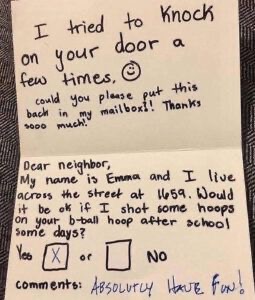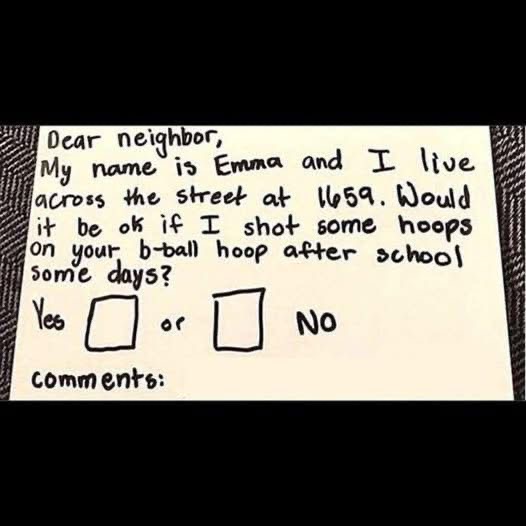Many of us have experienced the feeling of wanting to enjoy something but lacking the permission or opportunity to do so. This sense of longing is particularly relatable for children, who often find themselves drawn to things they cannot access or partake in. Whether it’s a toy, a game, or an activity, the desire to engage with something that seems out of reach can be overwhelming. A perfect example of this is illustrated through the story of a young girl who noticed her neighbor’s basketball hoop.

Living in a neighborhood where children often roam the streets looking for new adventures, she had seen the basketball hoop for a while. It was placed in the driveway of a house just across the street from hers. The hoop was a shiny, inviting object, promising hours of fun. Every time she passed by, she could hear the echo of basketballs bouncing off the pavement, and her imagination would race with thoughts of shooting hoops, feeling the ball glide through the air, and making a perfect shot. However, there was one problem: she didn’t have permission to use it.
The thought lingered with her for days. She knew that the hoop wasn’t hers, and she didn’t feel comfortable simply walking over and playing with it without the neighbors’ approval. Despite the urge to engage with the basketball hoop, she hesitated. She thought about how she might feel if someone used her things without asking. On the other hand, she had seen her neighbors around, and they seemed nice enough. Still, the idea of knocking on their door seemed intimidating. What if they said no? What if they didn’t want anyone using their property? These thoughts swirled in her head, making the simple act of asking seem more daunting than it should have been.
Eventually, the young girl decided that she would take a chance. She couldn’t get the basketball hoop out of her mind, and the opportunity to play with it seemed too precious to pass up. So, after school one afternoon, she went over to her neighbor’s house and knocked on the door. She stood there, waiting anxiously, but no one answered. She waited a little longer and then knocked again, but still no response. She began to feel disheartened. Maybe no one was home, or maybe the neighbors simply didn’t want to be bothered.
Not ready to give up entirely, the girl had an idea. She decided to leave a note instead, explaining her wish. She carefully wrote a short message, asking if she could play basketball after school. She made sure to mention that she would be respectful and take good care of their hoop. With a mix of excitement and nervousness, she placed the note in their mailbox, hoping they would respond kindly.
The next day, to her surprise, she found an envelope tucked inside her mailbox with a reply. The neighbors not only granted her request, but they did so with kindness and warmth. In the note, they invited her to play whenever she wanted and even encouraged her to bring friends along. They also mentioned that they hoped she’d enjoy the hoop and assured her that it was no trouble at all.
This simple gesture from the neighbors was more than just the permission to play with a basketball hoop; it was an act of generosity that had a ripple effect. The girl was overjoyed, and for the first time, she felt the thrill of shooting hoops on a beautiful day, without any worries. The neighbors’ kindness reminded her that sometimes, people are willing to share what they have, not because they are obligated to, but because they understand the value of spreading joy. They could have easily ignored the note or refused, but instead, they chose to offer a small piece of happiness.
This experience also served as a reminder for all of us about the importance of treating others with kindness and generosity. In a world where people are often preoccupied with their own concerns, acts of kindness can feel rare, but they can have a profound impact. By sharing what we have—whether it’s material possessions or simply a moment of time—we can brighten someone else’s day and create a sense of connection. The neighbors’ willingness to offer their basketball hoop to a young girl, someone they didn’t know very well, exemplified how small gestures can foster goodwill and remind us of the good that still exists in the world.
In the end, the young girl’s experience renewed her faith in humanity. It was a simple act—allowing someone to play basketball—but it spoke volumes about the power of generosity, kindness, and the joy of sharing. The neighbors not only gave her permission but also reminded her that, even in small ways, people can make the world a brighter place. And for her, the basketball hoop became much more than just a game—it was a symbol of the kindness she had received and the happiness it had brought her.
